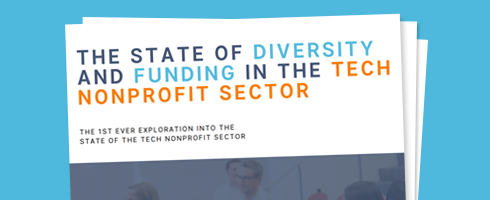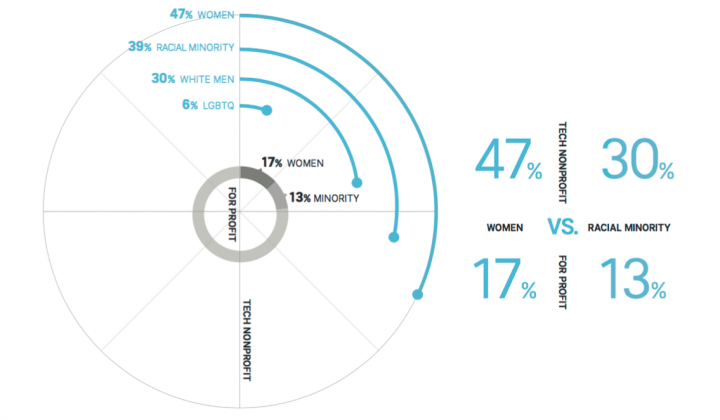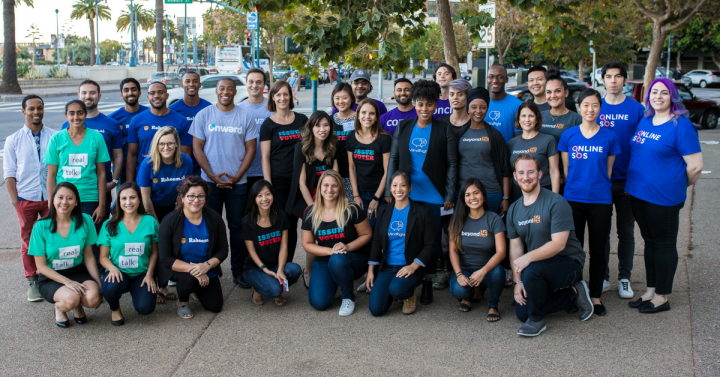The State of Diversity and Funding in the Tech Nonprofit Sector

Tech nonprofit diversity is the ray of light in the dark and seemingly endless conversations around diversity – or the lack thereof – in the tech space. It’s proven that diverse teams perform better, yet dismal diversity reports are the norm in Silicon Valley and beyond. But we’re seeing something different in the tech nonprofit space. Contrary to the typical accelerator cohort, 84% of Fast Forward’s tech nonprofit alumni have a co-founder who is a woman or person of color. We wanted to know if the same was true across the tech nonprofit sector.
The State of Diversity and Funding in the Tech Nonprofit Sector was created in partnership with AT&T, and with pro-bono support from Nielsen’s data team. AT&T’s support is part of AT&T Aspire, the company’s initiative to help provide access to education and training people need to get and keep good jobs, and speaks to Fast Forward and AT&T’s shared commitment to funding tech nonprofits.
In creating the report, we analyzed data from 348 tech nonprofits in our Global Tech Nonprofit Directory. Our Directory, which is like a Crunchbase for tech nonprofits, details information like funding raised, issue area, founder demographics, and more. As we embarked upon this investigation, we were optimistic that tech nonprofit diversity at large would be better than diversity in the for-profit space.

Get the Report
Tech Nonprofit Diversity – Bird’s Eye View
Social issues are inherently harder to solve. We find the strongest, most successful founders are building products that solve issues they have personally experienced. If lived experience is an indicator of tech nonprofit success, would we naturally see more diversity in the tech nonprofit space, since women and people of color are typically most impacted by social problems?
Yes. To our delight, we found diverse founders are much more abundant in the tech nonprofit space. 47% of organizations have a woman founder and 30% have a founder who is a racial or ethnic minority, versus 17% and 13% in the for-profit tech space, respectively.

The lack of venture funding given to startups founded by women or people of color is widely known. We anticipated this theme would carry into the tech nonprofit space, and that a founder’s gender or race would impact the amount of philanthropic capital they could raise. This hypothesis was correct to some extent, but not nearly to the degree we expected. The analysis of budget spread across race and gender actually opened up a broader problem in the sector.
The Funding Gap
Across the board, tech nonprofits struggle to leap from “seed” funding, or budgets under $500,000, to budgets over $1 million, regardless of gender or ethnicity. This signals an urgent need for more early stage investors in the space. If tech nonprofits are to create scaled social impact, and if we hope to advance diverse leaders, we need more philanthropists supporting them between “seed” stage, and the $1 million funding breakthrough.
Examining diversity and funding by issue area revealed more compelling revelations for the sector. Tech nonprofits founded by women and racial minorities outpace white men in reaching budgets over $1M in the healthcare and civic engagement sectors, but lag behind in education and human rights.

Technical Team Diversity
Understanding the diversity spread across tech nonprofit founders was one thing, but we also wanted to know more about the composition of their technical teams. To round out this research, we partnered with CTOs for Good, a collaborative group of technical leaders at nonprofits. CTOs for Good members CJ Rayhill (PLOS) and Omar Khan (Common Sense) conduct their own study on technical teams at tech nonprofits. Their findings were fascinating. While diversity is strong across tech nonprofit founders, the same is not true of technical staff. Tech nonprofits score better in terms of diversity on technical teams than their for-profit peers, but 67% of engineering teams at tech nonprofits remain white, and 72% of technical employees are men.
Tech nonprofit diversity gives us a beacon of hope for the tech space, but there’s still much work to be done. We look forward to continued collaboration with entrepreneurs, funders, community leaders, and technologists, so we can elevate the work and representation of diverse founders, working on diverse and wildly challenging social problems.